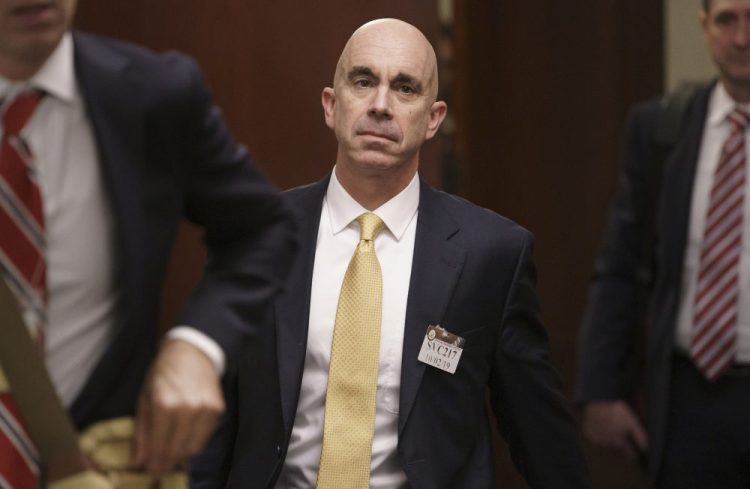It’s too soon to say for certain that President Donald Trump’s firing of State Department Inspector General Steve A. Linick was a politically motivated effort to stop Linick from doing his job, but the administration’s record of muzzling watchdogs inspires little confidence that his removal was appropriate.
After Trump fired Linick last week, saying that he had lost confidence in him, Democrats in Congress indicated that the inspector general had been investigating actions by Secretary of State Michael R. Pompeo and that his firing might have been an illegal act of retaliation.
Initial reports of the firing focused on an investigation Linick was said to be conducting into Pompeo’s alleged use of employees to perform personal errands. (Pompeo told The Washington Post that he did not know Linick had been investigating him.) But on Monday, Rep. Eliot L. Engel (D-N.Y.), the chairman of the House Foreign Affairs Committee, said that Linick also was investigating — at Engel’s request — Trump’s declaration of an emergency last year to expedite arms sales to Saudi Arabia without congressional review.
Linick, a former assistant U.S. attorney in California and Virginia, was appointed to his position by former President Barack Obama, but there is no sign that he was a partisan operative. A report issued by his office in 2016 was critical of Hillary Clinton’s use of a private email server while she served as secretary of State, a practice that proved to be a potent campaign issue for Trump.
During the current administration, Linick has criticized the State Department’s handling of personnel issues, accusing some of the president’s appointees of retaliating against career officials. Linick also played a peripheral role in Trump’s impeachment, turning over to House investigators documents apparently sent by the White House to the State Department that promoted conspiracy theories about Ukrainian involvement in the 2016 U.S. election.
Emboldened by his acquittal in the Senate, Trump has engaged in a petulant purge of officials connected to his impeachment, including Michael Atkinson, the former inspector general of the intelligence community. Atkinson rightly had notified Congress about a whistleblower complaint he deemed urgent; it turned out to revolve around Trump’s outrageous attempt to have Ukraine investigate a prospective political opponent, former Vice President Joe Biden.
Trump also demoted Glenn Fine, the widely respected acting inspector general of the Defense Department, in the process stripping Fine of his role as chairman of a committee monitoring how the administration spends trillions of dollars in COVID-19 pandemic relief approved by Congress.
Trump also has moved against Christi A. Grimm, the acting head of the inspector general’s office in the Department of Health and Human Services. Grimm angered Trump by issuing a report that found that U.S. hospitals were dealing with “severe” and “widespread” shortages of COVID-19 testing supplies and personal protective equipment. After that incident, Trump nominated a new permanent inspector general to replace Grimm.
After Trump fired Atkinson, Michael Horowitz, the Justice Department inspector general and chairman of the Council of the Inspectors General on Integrity and Efficiency, issued a statement praising Atkinson for “his integrity, professionalism, and commitment to the rule of law and independent oversight.” Horowitz also promised that inspectors general would “continue to conduct aggressive independent oversight,” including of pandemic-related spending.
Brave words, but inspectors general in key departments serve at the pleasure of the president, and this president repeatedly has expressed displeasure when watchdogs barked. Congress also has oversight responsibility, and House Democrats have promised to scrutinize Linick’s firing. If Pompeo and Trump believe that Linick exceeded his authority or was “undermining” the State Department instead of elevating its work, as Pompeo asserted on Monday, or that he wasn’t stopping people in his office from leaking drafts of its reports, as a top State Department official told the Washington Post, they need to make that case to Congress.
But even if it were to be established that Trump wrongly dismissed Linick, the president is unlikely to alter his behavior as long as congressional Republicans (with a few honorable exceptions such as Sen. Mitt Romney of Utah) act as his apologists and enablers. The only sure remedy for Trump’s aversion to oversight is his removal by the watchdogs he should fear the most — the voters.
Editorial by the Los Angeles Times
Visit the Los Angeles Times at www.latimes.com
Distributed by Tribune Content Agency, LLC
Send questions/comments to the editors.



Success. Please wait for the page to reload. If the page does not reload within 5 seconds, please refresh the page.
Enter your email and password to access comments.
Hi, to comment on stories you must . This profile is in addition to your subscription and website login.
Already have a commenting profile? .
Invalid username/password.
Please check your email to confirm and complete your registration.
Only subscribers are eligible to post comments. Please subscribe or login first for digital access. Here’s why.
Use the form below to reset your password. When you've submitted your account email, we will send an email with a reset code.